Visionary Leaders Program (VLP)
Purpose
This program aims to develop visionary leaders (top researchers, engineers, and professionals) who can contribute to increasing the presence of Japan's research and industry in the international community.
By participating in this program, you can strengthen the critical thinking, communication, and practical skills necessary to demonstrate your expertise in the international community, and develop the leadership spirit to lead society.
outline
Modern society is faced with many big problems. While it is difficult to solve these problems easily, there is also the potential for big business. If we can achieve challenging business development that leads to solutions, it will lead to the development of the earth and humanity.
This program aims to nurture leaders with such vision and offers three courses: Entry, Basic, and Advanced.
In the Entry Course, students will acquire the basic skills necessary for visionary leaders and train to think in teams to find solutions to social issues based on future thinking. In the Basic Course, students will learn the knowledge and thinking methods necessary for implementing research seeds in society, and compete for training opportunities by making business proposals in teams. In the Advanced Course, students will test business hypotheses and create prototypes with young researchers from companies, and take on training from Silicon Valley in the United States.
By progressing through the Entry, Basic, and Advanced levels, we aim to increase the degree to which students can achieve the program's objectives. Furthermore, in the process, students can explore the intersection between real-world issues and their daily studies and research, and can broadly and deeply explore the areas in which they can contribute, thereby strengthening their motivation and meaning.
*This is an add-on program that teaches students how to apply the high level of research skills and expertise they have acquired in specialized education courses (Faculty & Graduate Schools) to society.
Course Overview
Entry Course Basic Course:
Students will acquire practical skills such as comprehension, expression, and teamwork, which are essential for being a visionary leader. In addition, students will be motivated to study by concretely depicting an ideal society from a future perspective and discussing solutions to problems.
Basic course: Creating a business plan:
This course is for those who have completed the Entry course. Students will learn basic knowledge (ethics, intellectual property law, patents, etc.) necessary for the social implementation of research seeds, as well as methods for constructing thinking. They will also gain experience in launching and promoting a project as a team. Teams selected in the competition will be able to participate in practical training.
Advanced Course Corporate problem solving practice:
This course is for those who have completed the Basic course. Together with young researchers from companies, participants will verify their business hypothesis, create prototypes, and repeatedly review their plans while receiving advice from experts. Finally, they will increase the feasibility of their plans through SVA Innovation training (there is a possibility of selection).
Eligible (All courses)
The program is open to students from first-year undergraduates to doctoral students in all faculties, graduate schools, and graduate schools.
*The Advanced course is also open to working professionals and postdocs from companies.
List of courses
Please see Google Classroom "Science Visionary Leader Program" (class code: kkgkiaj) ⇒ "Classes" page ⇒ "2020 VLP Course List (for students)".
Program introduction video
[Updated May 28, 2020 9:00]
Please view the video from Google Classroom "Science Visionary Leader Program" (class code: kkgkiaj) ⇒ "Classes" page ⇒ "VLP Introduction Video".
Recruitment Information Session
An information session will be held on the first day of university classes (including an online information session).
We will update the information as the situation changes, so please check back regularly.
[Updated July 13, 2020 12:00]
● Online information session (Zoom)
Please check the details (Zoom meeting ID, password, etc.) from Google Classroom "Science Visionary Leader Program" (class code: kkgkiaj) ⇒ "Classes" page ⇒ "Online Information Session (Zoom)".
1st session: Friday, June 5, 2020, 12:10-12:50 (already held)
2nd session: Monday, June 8, 2020, 12:10-12:50 (completed)
3rd August 21, 2020 (Friday) 12:10-12:50
3rd session: Friday, July 10, 2020, 12:10-12:50 (already completed)
4th session: Thursday, July 16, 2020, 12:10-12:50 (already held)
5th session: Friday, August 21, 2020, 12:10-12:50 (already held)
●Recruiting participants for trial course (Entry course)
Date and time: Saturday, August 1, 2020 10:00-12:00
Method: Online (Zoom or Meets) *The meeting ID will be sent only to participants after the application deadline.
How to apply: Google Classroom "Science Visionary Leader Program" (class code: kkgkiaj) ⇒ "Classes" page ⇒ "Trial Course (Entry Course) Application Form"
Application Deadline: Monday, July 20, 2020, 12:00 noon
How to apply
Please apply via Google Classroom “Science Visionary Leaders Program” (class code: kkgkiaj) ⇒ “Classes” page ⇒ “2020 VLP Participation Application Form.”
●Application Deadline
Friday, September 4, 2020, 12:00 noon
Inquiries
Innovation Advancement Organization
Phone: 042-367-5756
Email: innov (insert @ here) cc.tuat.ac.jp
*Students who participated in the Global Professional Program should contact us using the details below.
Organization for the Advancement of Education and Global Learning
Associate Professor Yoko Iwata
Phone: 042-367-5304
Email: y-iwata (insert @ here) cc.tuat.ac.jp
Brochure
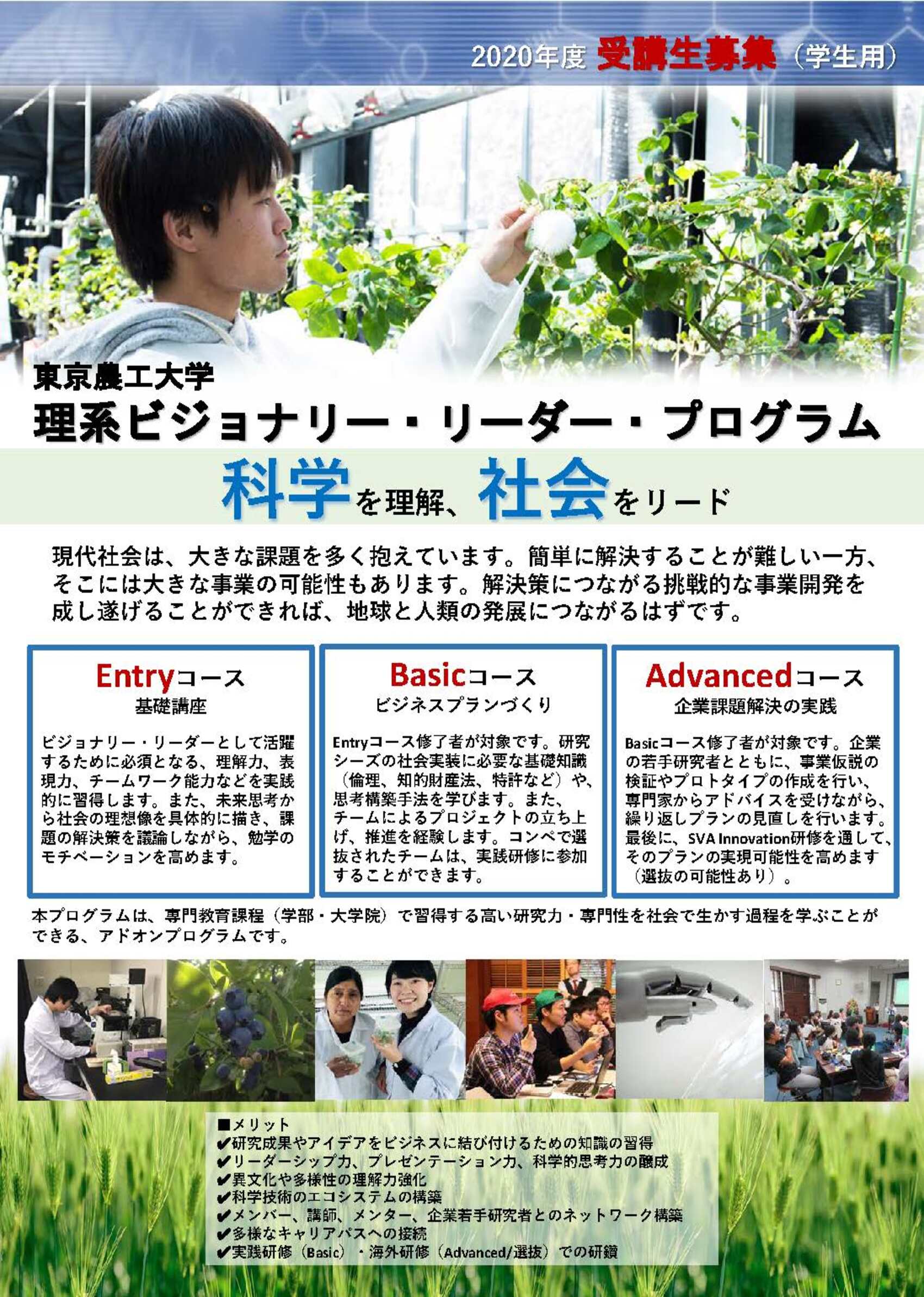
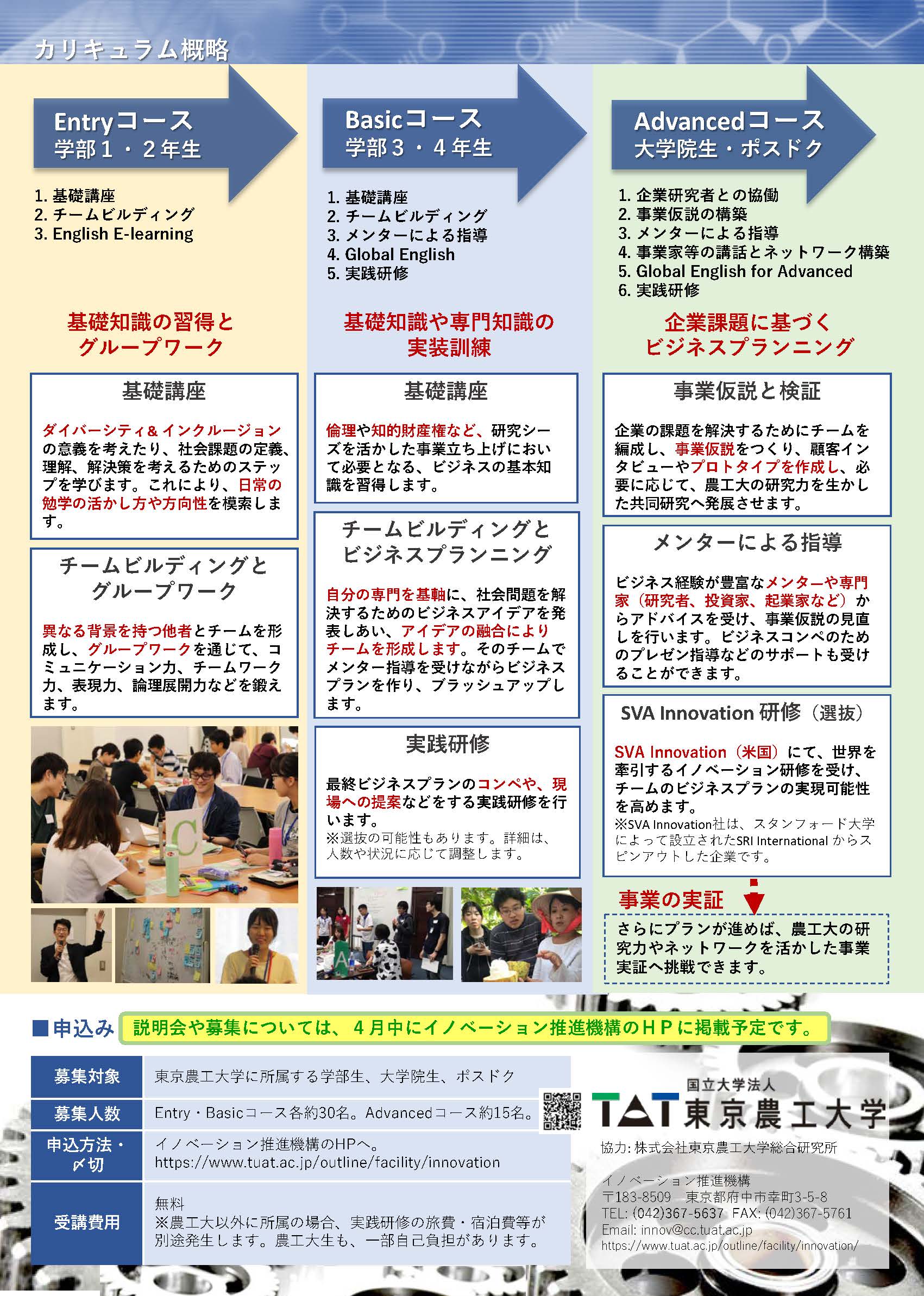
Participant comments
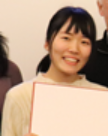
<SVA training experience>
I have always wondered what innovation is.
It often sounded like a convenient word used by various organizations. However, the word "innovation" spoken by Senior Assistant Professor in this training, who have actually created innovation, sounded like a living word, and I learned that innovation is about bringing new value to customers. In the business plan presentation, I was repeatedly asked, "What do customers really want?", and I was able to find ways to improve my plan. In the future, I would like to develop earth-friendly products at a food manufacturer. Until now, I think I thought that "environmentally friendly products are unconditionally good". However, from what I learned in this training, I realized that pushing the idea of being earth-friendly will not make a product that sells (= spreads throughout the world), and that the most important thing is to meet the needs of customers. It is a great asset for me to have experienced this training as a student.
Mizuho Okura / 2019 Advanced Course
(At the time, I was a second-year Department of Biological Production Science Graduate School of Agriculture. Currently, I am at a major food company.)
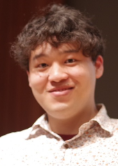
Participating in the Visionary Program for Science Researchers has greatly changed my perception of "society" and "social implementation of technology." Previously, I was not able to see social issues as my own. Through my training at Can Tho University, I gained a strong sense of the many deeply rooted issues in Vietnam. I realized that truly taking an interest in social issues means reexamining social issues such as "traffic congestion, garbage, and river flooding" from the perspective of Vietnamese people. Also, during the tour of the Acecook Vietnam factory, I was impressed by how important it was for the company to listen to local people's opinions in order to solve the issues associated with localizing products. This means that forcing technology or products on others is not social implementation. I learned that it is important to recognize that my common sense is nonsense in other regions and to provide technology that is adapted to society. I would like to utilize these experiences I gained in the program in my own research and future endeavors.
Ryo Yamaguchi / 2019 Basic Course
(Currently in the Graduate School of Engineering 's program Department of Applied Chemistry)
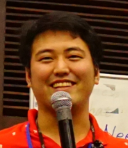
Participating in the Doctoral Visionary Promotion has changed my view of business. Until then, I had the image of "business = entrepreneurship" and thought it was a world that had nothing to do with me as a job seeker, but participating in this project has allowed me to concretely envision myself after getting a job. Even now that I'm actually employed at a manufacturer, I still feel that it's important to think from the perspective of "how to link research to product development and to a business that delivers products to consumers." In addition, through the Doctoral Visionary Promotion, I was able to meet many passionate colleagues. I feel that the time I spent discussing and spending with the members who came up with the business related to microbial fermentation together with me, the members who accompanied me to the training in Vietnam, and the university students at Can Tho University was truly valuable. I would definitely recommend this course to anyone who wants to devote themselves to something while they're a university student!
Haruaki Kato / 2018 PhD Visionary Promotion
(At the time, I was a second-year master's student in the Department of Applied Biochemistry at the Graduate School of Agriculture. Currently, I am a member of a major manufacturer.)
